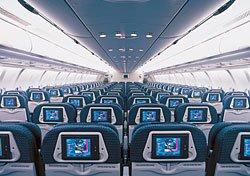Chet Geveda (CG) is JETERA’s CFO. During 2Q07 Chet was an airline passenger to Greece, Italy, Monaco, Scotland, California and Bermuda. In the process, he has become an up-to-the-minute critic of some of the things that result in customer dissatisfaction when flying. I (TL) connected with him on the eve of his next round of travel to develop this report.
TL: Chet, as a member of the JETERA team, all your travels are a form of research. What are you learning that can help connect JETERA to travelers?
CG: I think I’m an experienced traveler, which means I strive to travel as light as possible. This is not just a matter of lugging too many heavy possessions through an airport, but also the scramble and inconveniences of security processing and restricted space in aircraft. Despite my desire to travel light, the lack of options force me to load up on things to keep my mind occupied when flying and waiting.
TL: Lack of options?
CG: Airlines offer an extremely limited array of options for their customers. Entertainment options are very restricted—just a couple of movies I usually have already seen or don’t want to see and the inflight magazine and shopping catalog. This would be OK if I only flew the NYC-DC shuttle, but I take a lot of long flights and that really exposes the problem.
TL: How do you describe the problem?
CG: I see the problem the same way virtually every other traveler sees it. It’s this: we live in a world of almost boundless options for entertainment, education, communication, information-gathering and productivity tools. Yet most of these are unavailable when traveling. I feel cut off and, worse, I know it doesn’t have to be this way.
TL: Chet, we’re all pretty used to this. Aren’t most travelers resigned to traveling this way?
CG: Yes, but I think they get less resigned every day and here’s why. The combination of growing passenger traffic, intense security and air-traffic-control pressures are conspiring to get us to the airport earlier and forcing us to spend more time waiting in the terminal, on the tarmac and in the air. For many, this adds up to a lot of wasted time, which produces frustrations and dissatisfactions. I think we are all ready for a change for the better.
TL: So you’re saying JETERA can be the antidote for all this dissatisfaction?
CG: To a great degree, yes. The reason is that time passes quickly when we are engaged with something that interests us, such as reading a book, seeing a movie or communicating with the office or family when we’re locked into the travel process. But beyond this, why should I have to carry a laptop, I-pod, DVD player, books and magazines when most of this material is available digitally. Why can’t my preferred forms of entertain, communication and productivity tools just be there for me and for anyone who wants it? The technology exists, yet not for air travelers.
TL: Airlines historically lose a dollar a year per passenger providing entertainment. Is this the barrier?
CG: In part. The bigger issue is radical change—even when there is the certainty of making a million dollars or more in free cash flow for an aircraft with 100-plus seats after the first full year of operation. This will take a bit of time to ramp up, but it’s a certainty, not a promise. Meanwhile, two million daily US passengers don’t have options for much greater satisfaction when traveling.
TL: Won’t this situation change as soon as JETERA is providing travelers with more options and advertisers with better focused media?
CG: You bet it will. My job is to make sure that happens as soon as possible so all of us can throw away our frustrations and unnecessary baggage when traveling and stay connected to all the things that matter to us.
Tuesday, August 14, 2007
Subscribe to:
Posts (Atom)


